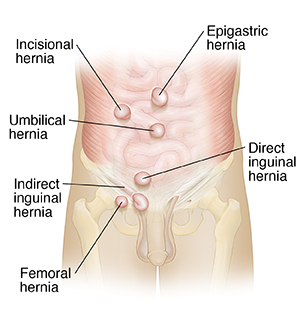What Is a Hernia?
What Is a Hernia?

When a bulge forms
When there is a weak area in the abdominal wall, an organ or tissue can push outward. This often causes a bulge that you can see under your skin. The bulge may get bigger when you stand up. It may go away when you lie down. You may also feel some pressure or mild pain when lifting, coughing, urinating, or doing other activities.
Types of hernias
The type of hernia you have depends on its location. Most hernias form in the groin at or near the internal ring. This is the entrance to a canal between the abdomen and groin. Hernias can also occur in the abdomen, thigh, or genitals.
An incisional hernia occurs at the site of a previous surgical incision.
An umbilical hernia occurs at the navel.
An indirect inguinal hernia occurs in the groin at the internal ring.
A direct inguinal hernia occurs in the groin near the internal ring.
A femoral hernia occurs just below the groin.
An epigastric hernia occurs in the upper abdomen at the midline.
Diagnosis
In most cases, your healthcare provider can diagnose a hernia by doing a physical exam.
In some cases it might not be clear why you have a swelling in the belly wall. Then your provider may order an imaging test such as an ultrasound. This can help with the diagnosis.
Surgery
A hernia will not heal on its own. Surgery is needed to fix the weak spot in the abdominal wall. If not treated, a hernia can get larger. It can also cause serious health problems. The good news is that hernia surgery can be done quickly and safely. In some cases, you can go home the same day as your surgery.
When to call your provider
Call your healthcare provider right away if the swelling around your hernia becomes larger, firmer, or more painful. These may be signs that your intestines are stuck in the abdominal wall. This is an emergency. The hernia must be repaired right away to avoid serious problems.
Updated:
April 03, 2018
Sources:
Overview of abdominal wall hernias in adults. UpToDate.
Reviewed By:
Adler, Liora C., MD,Fraser, Marianne, MSN, RN,Image reviewed by StayWell medical illustration team.